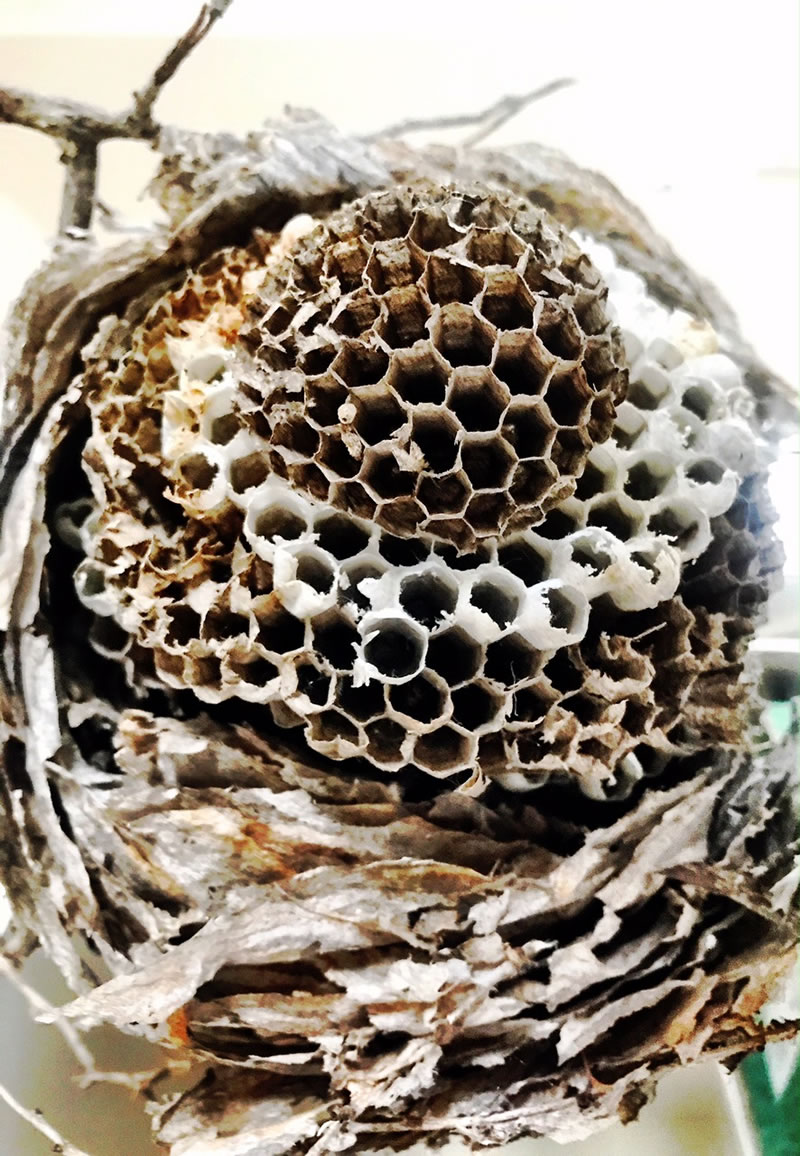
THE HORNET’S NEST OF INSPIRATIONS
When I was young, till now, I have a profound fascination with insects. Really, arthropoda—insecta, arachnida and crustacea. That’s insects, spiders and crab-like creatures. Those hard-shelled creatures of earth, air and water.
I thought this fascination would lead to a career in science, instead it led to another form of analysis.
Design.
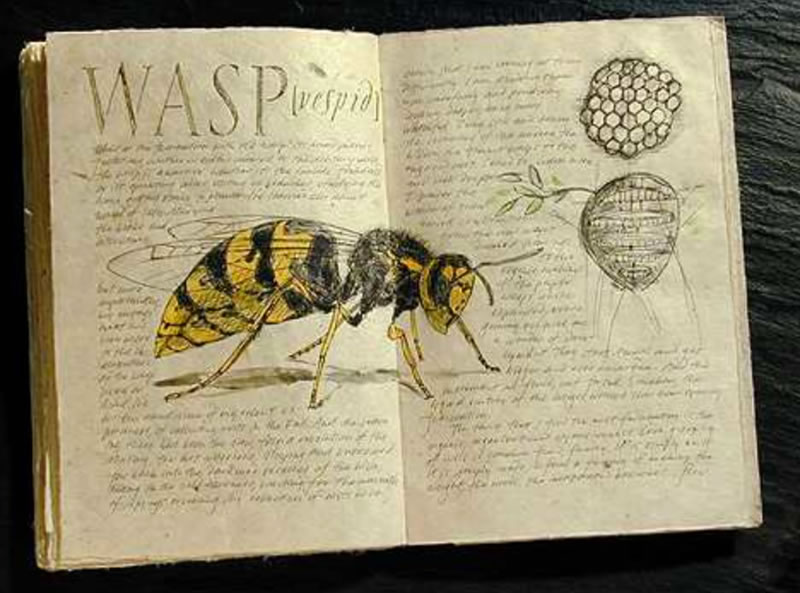
When I was in college, it was suggested by my professor that my lab journals would be better tooled to art — and more particularly: book design.
Back in the
pre-digital age,
lab journals were done mostly by hand, then typed out, old style typewriters and built as letter-cast booklets. Illustrations and messaging, for me, became more labyrinthine, layered in content, story told illustrations and textual messaging. I was more interested in how things were organized — how ideas could be spread on page, laid out as journeys of exploration.
So I went that way, book design, fine printing, history of letterforms, architecture and art.
And how, therein, culture interplays.
I studied that then, and study that now.
And the nest, nest-builders
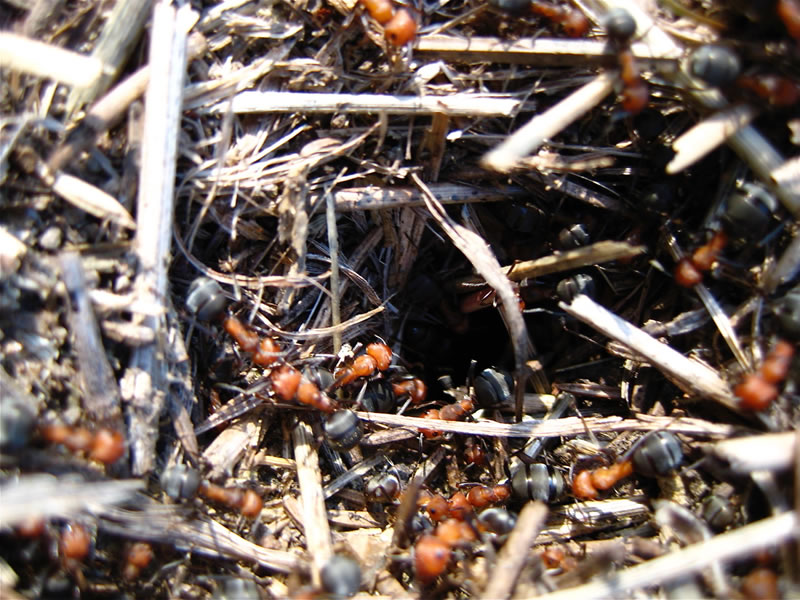
And to the nests, I find them fascinating, for inside the nest is a storytelling of its own.
Wasps?
The Foundress of the nest is the Queen, who starts alone in her egg-laying and building of her woven layered structures. She lays them and seeds the eggs in chambers and progressively builds out her community of workers and food-searchers, and her organization grows.
Meanwhile, beyond the geometric nest cavities, the creative perfection of the hexagon, the wasp is gathering wood chips
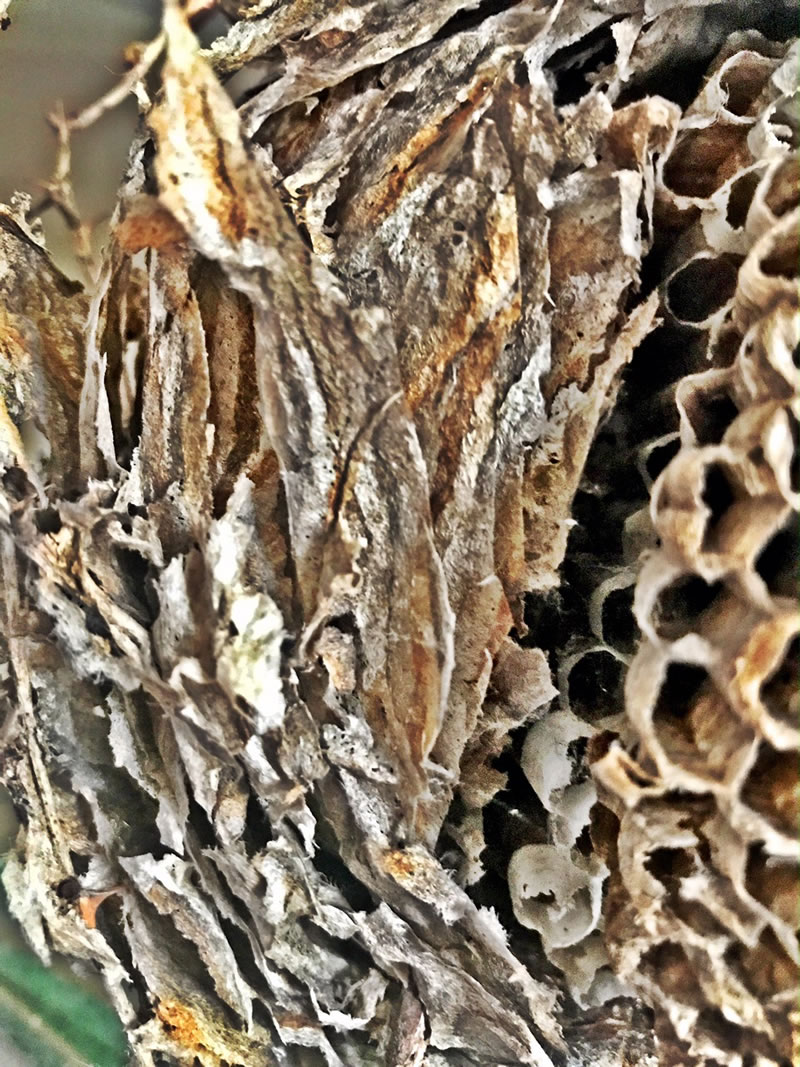
and macerating the tissues to create its extruded paper as a sheathing to her cells
of egg containment — and the enclosing,
self-cooling nest structure itself.
That design that she follows is just that, the most efficient use of space-making imaginable. Ivars Peterson wrote, “More than 2,000 years ago, Greek scholars commented on how bees apparently possess ‘a certain geometrical forethought’ in achieving just the right type of enclosure to hold honey efficiently.” “Mathematician Thomas C. Hales of the University of Michigan at Ann Arbor has now formulated a proof of the so called ‘honeycomb conjecture,’ which holds that a hexagon grid represents the best way to divide a surface into regions of equal area with the least total perimeter.” “The honeybee’s honeycomb fits neatly into the atlas of mathematically optimal forms found in nature.” That same structure fits the wasp’s design.
I look at the nest as a symbolic form, an enclosure of what lies within — the seeds, the ideas grouped, swathed in yet another containment, layered, that is another holder of content.
One tier leads to another. On one sheath of containment there is another, and another, and they cleave to each other.
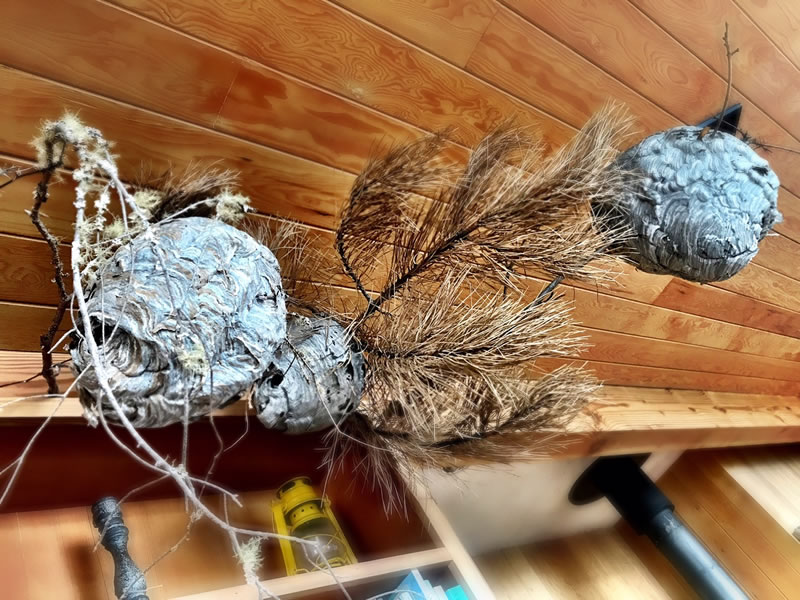
Metaphorically, I see them as a visualization of dreams, forms in forms, ideas in ideas, deeper synchronies, rhythms and patterning.
To it, I keep that metaphor near, as a kind of meditation. At GIRVIN’s studio in the islands, I have set of collected nests hanging in the place, as contemplative offerings.
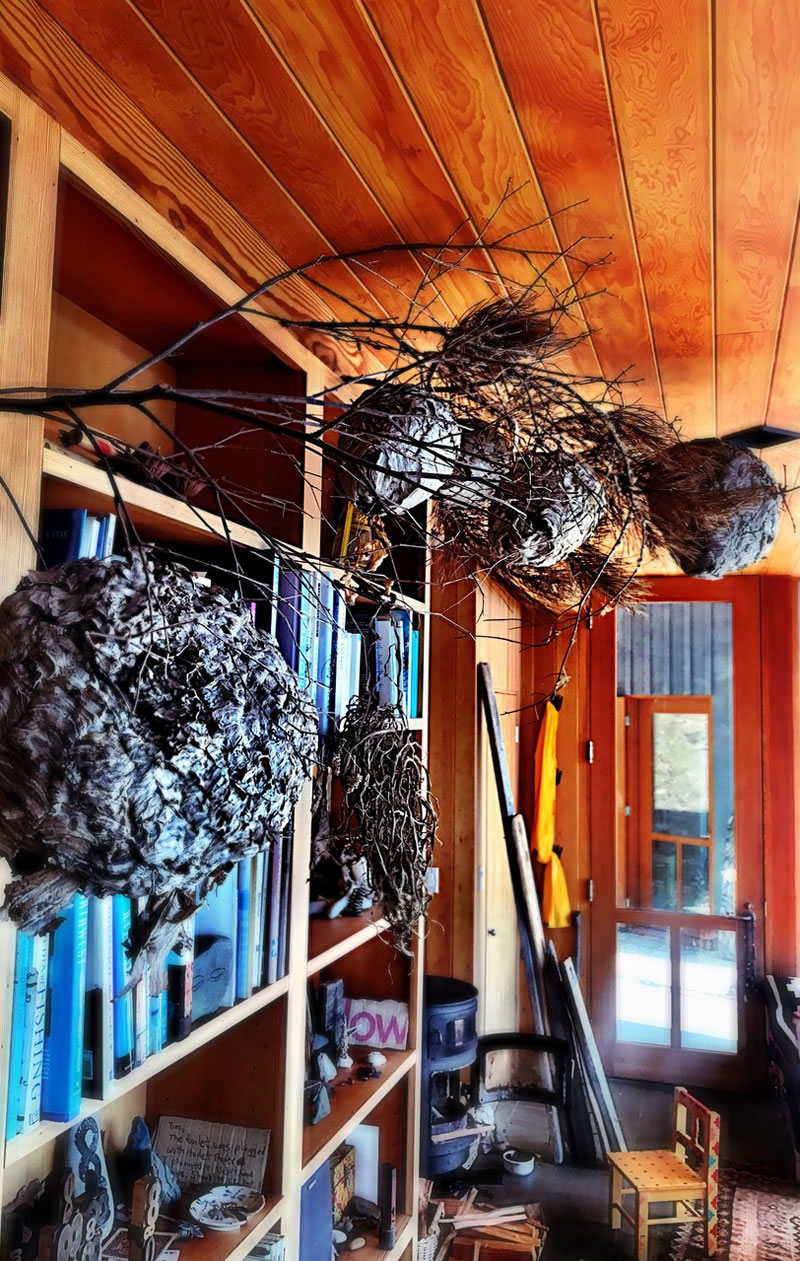
They array from the ceiling, they rest as arrangements and table settings, they are there to be seen and known.
Studied.
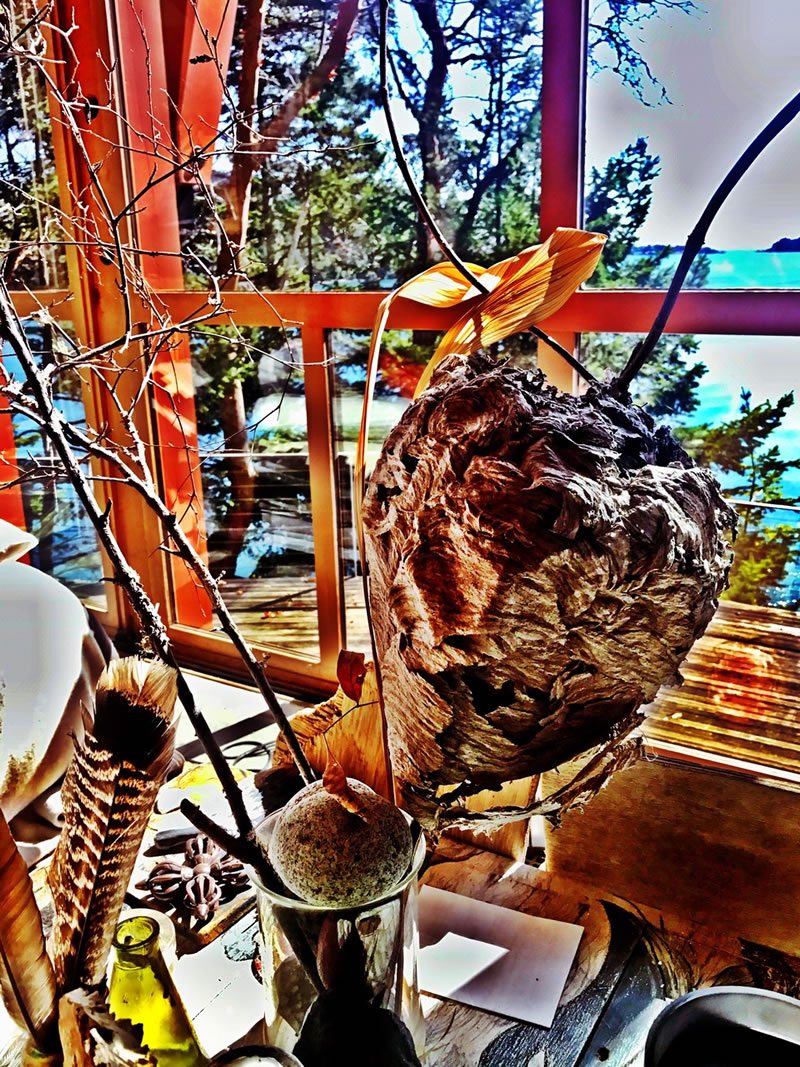
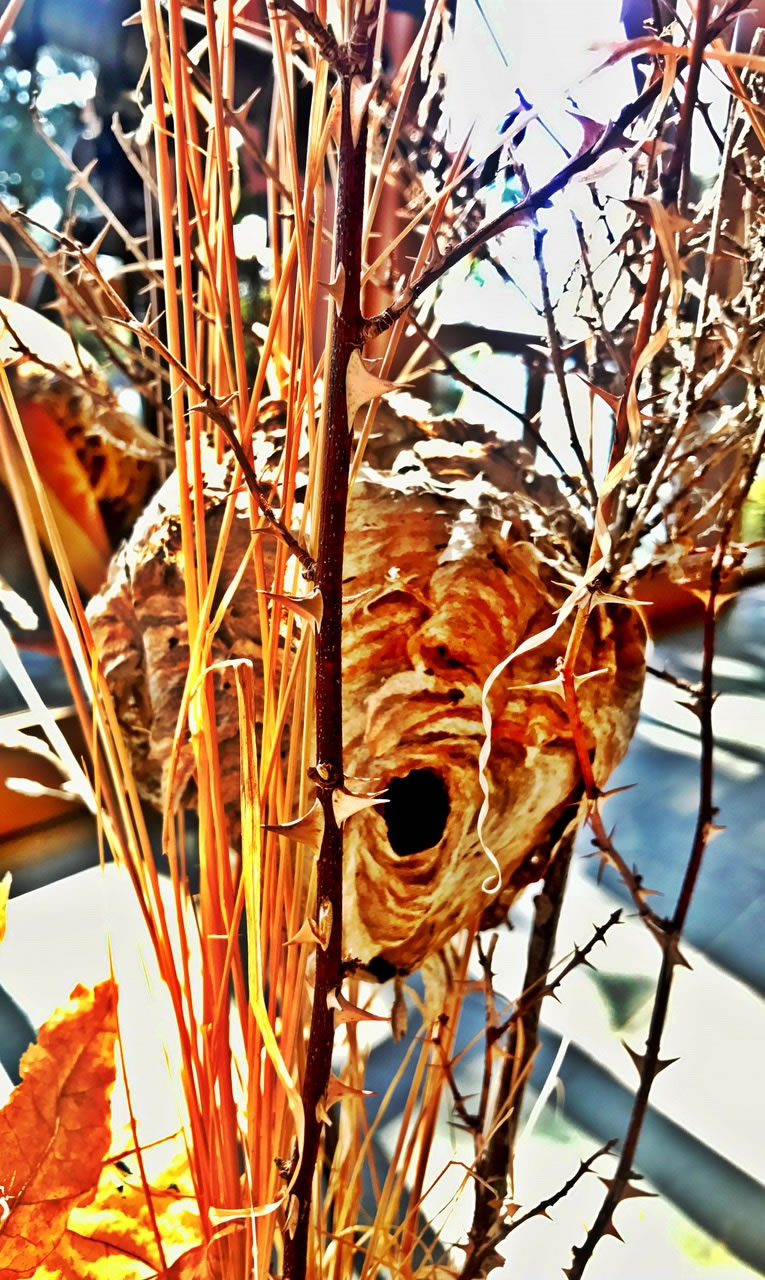
The contemplation on the nest reaches back in time, since I’ve long sought them out.
And reaching to others, similarly fascinated in the arrangement of nests.
A note to Eartha Kitt
—
Dear Ms. Kitt,
I’ve long admired the character of you. Your song. Your acting. Your spirit. And now, your love of nature; it was the one thing that I’d not known about before. And now I do.
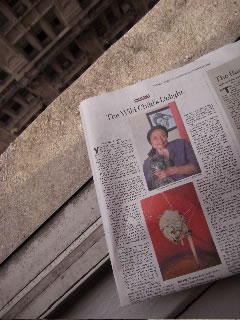
I loved your story about your experience as a child, being one that roamed and explored, easily happy in being alone. And I was like that, and I am like that.
And I did (and do) love the hymenoptera: the vespid(ae), the solitary and paper wasps, the masons. All of them in that class I love, and do savor. And they are all the same in their taxonomic grouping, yet they are, as well, all different. Even ants number among them.
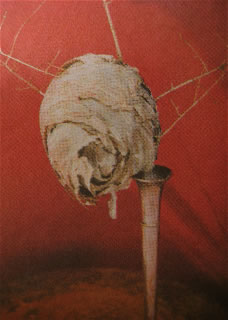
But like you, the one thing that I do love is the architecture of their making. So as I wander the island, the neighborhood, the woods, I’ve become a expert sighter of those nests — either live and active, or silent in winter. And if they are live; I’ll watch them, and wait till the cooler seasons come. The queens (the foundress) quiet in hibernation, the drones die out. Friends find them for me as well.
I’ve watched them from the opening single cell, one little egg, one tiny larva, to colonies in Costa Rica that as a big as a kneeling catcher at homeplate sitting atop a tree. I’ve seen grand cascading honeycombs in the jungles of Cambodia, and tiny little miniature water wasps nests in the tree tops of Central America, underground bumblebee galleries and the single-bored home (and holes) of the giant black bees of Bali. I’ve spied hanging angry firewasp nests (just as I was reaching out to climb higher) in the swamps of Kauai, and like you, I’ve run like hell to escape the stringing (and stinging) scented attack line of black and white bald-faced wasps chasing me through the forest. I can watch the breeze for wasp lines and follow that winged corridor to a nest. Like you, I’d imagine.
Being one of those people that learned to see in and recognize those warning colors, I’ve not been stung in decades.
But I love how they build their colonies — whatever the type — and friends and family have contributed to these, at my island house, which is up north of Seattle, by some 80 miles.
Here are some images of what they look like, installed.
Who knows, perhaps one day we’ll meet?
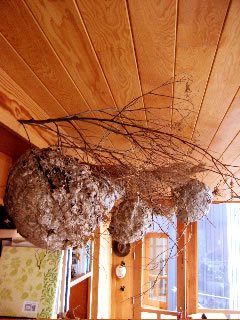
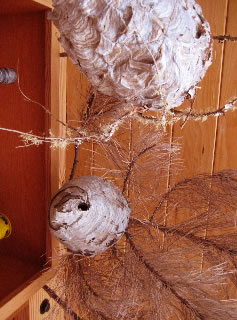
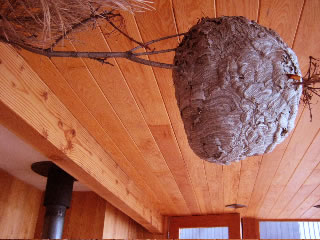
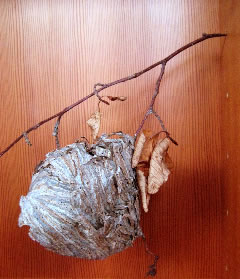
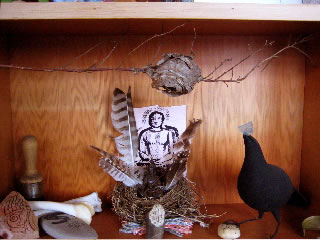
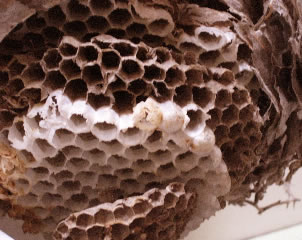
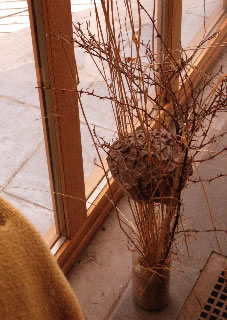
As a designer exploring metaphor and symbolic design? What of making your own nest?
This contemplation:
The beginning, forming the nest.
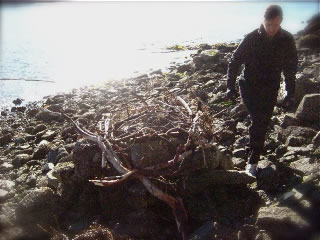
I’ve written about creating an installation — actually, many installations and placements — over time.
Dawn Clark and I built a nest — woven of sticks that we found on the beach. One week later, two weeks later, it’s still there, but it’s moved; it simply lifted up, and drifted to another location. Three weeks out — it’s moved again. Things come and go, and by the time I return the next time, some weeks from now, it will likely be moved again. Another time, in transition.
The woven nest:
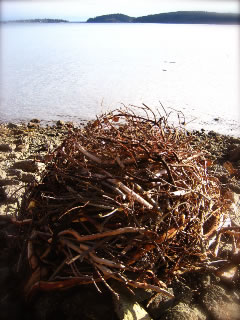
Nests, since my childhood, have been a fascination. And that fascination has continued. Nests, the Bird’s Nest of Beijing — some observations and historical references for me, baskets and the overlay of idea(l)s. And sharing a love of nests with Eartha Kitt — another lover of nests or the poetic implications, the meditations on the nature of the nest, the weaving interplay of life and wonder.
The contemplation is about the interlaying of forms, energy, beauty — and the meditation on that symbolism. And the formation, was about that weaving, the interplay of found, interwoven beach found objects:
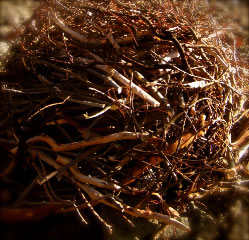
To any word, it’s worth exploring meaning and context:
nest (n.)
O.E. nest “bird’s nest, snug retreat,” from P.Gmc. *nistaz (cf. M.L.G., M.Du., Ger. nest), from PIE *nizdo– (cf. Skt. nidah “resting place, nest,” L. nidus “nest,” O.C.S. gnezdo, O.Ir. net, Welsh nyth, Bret. nez “nest”), probably from *ni“down” + *sed– “sit.” Used since M.E. in ref. to various accumulations of things (e.g. a nest of drawers, early 18c.). The verb is O.E. nistan, from P.Gmc. *nistijanan. Nest egg “retirement savings” is from 1700, originally “a real or artificial egg left in a nest to induce the hen to go on laying there” (1606).
nestle (v.)
O.E. nestlian “build a nest,” from nest (see nest). Figurative sense of “settle (oneself) comfortably, snuggle” is first recorded 1547.
To get to this section of beach, below the house, involves climbing down a cliff — we did that with a shoulder bag of tools, to cut and form the array the timbers, sticks and branches. Finding a grouping of stones, and then expanding the nest as a weaving around that substructure, we built and wove the collection of sticks and branches that had washed up on the shoreline.
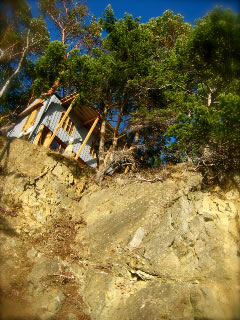
And looking down from the cliff, out to the sea, the nest resting on the shore.
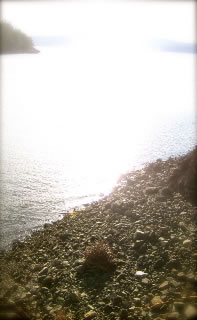
That night, we returned, as the water arose, to shoot the nest, and set fire to the heart of the installation.
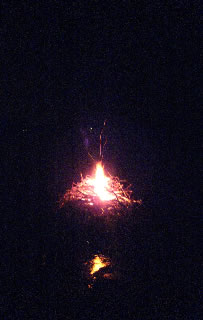
From there, the following morning, we waited on the incoming tide — and the nest arose in the water, still holding its shape, arising from the stone base, and floated away.
The following day, adrift.
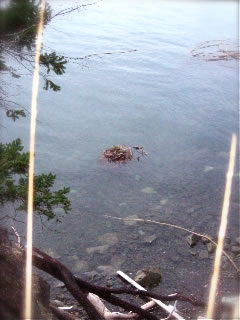
That installation, still holding, has continued to move around the rocky shoreline.
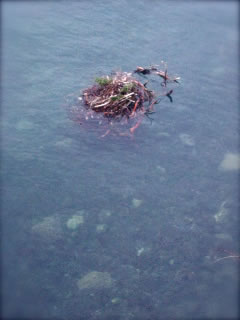
Weaving, symbolically, is about the layering of forms, above and below — the loom of ideas, creates the tapestry of experience. And, in the spirit of ideas, and ideals, I visualize them as being woven, layers of sentiment that form around the heart of an idea. Or an ideal. Or a dream.
Nest from the cliff, near the memorial cairn.
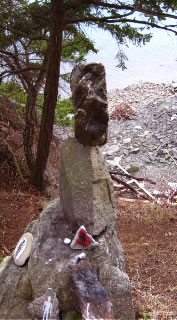
Beauty:
fullness.
Wonder, I do, about
What’s nest, next?
Tim | decatur island
TIM
….
THE STRATEGY OF RE-IMAGINING
HOSPITALITY & GUEST ENGAGEMENT
DESIGNING ENVIRONMENTS FOR UNFORGETTABLE PLACES:
HOTELS |RESORTS | SPAS | RETAIL | RESTAURANTS |
SPAS + WELL CENTERS
Happiness experience design, storytelling + brand = goo.gl/WCHxLM
Thank you for this. Always thoughtful and inspiring.
Hi I have been making stuff since 2014 and now I am making a series of art mixed media. I am focused on nests and decided to search the meaning. Your post is perfect for me. Thank you Toni